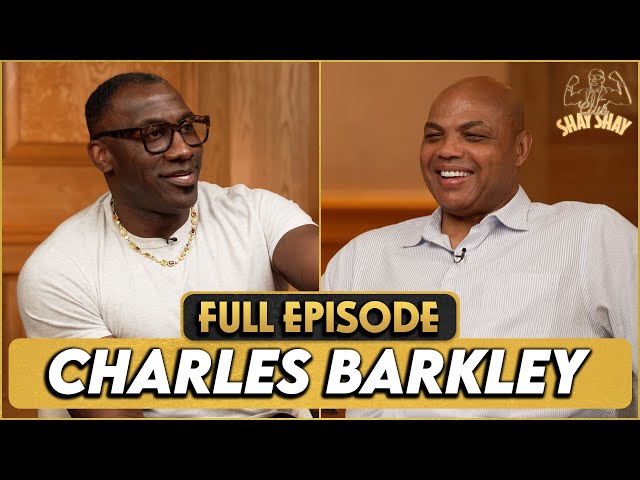Interview with Charles Barkley
Former NBA Player
by Club Shay Shay • 2024-05-01

In a much-anticipated conversation on Club Shay Shay, NBA legend Charles Barkley sat down with Shannon Sharpe for a frank and often hilarious deep dive into his life, career, and unfiltered philosophies. From his humble beginnings in Alabama to his iconic status as an analyst, Barkley offered a rare glimpse into the formative experiences, key mentors, and hard-earned wisdom that shaped the Round Mound of Rebound into the beloved figure he is today.
From Leads to Legend: The Raw Education of Charles Barkley
Charles Barkley’s childhood in Leads, Alabama, painted a vivid picture of poverty but also a tight-knit community and immense maternal strength. Growing up in the projects, he was oblivious to his family's financial struggles because "everybody around him is poor," sustained by his mother and grandmother who worked tirelessly as a maid and in a chicken factory. However, the absence of his father cast a long shadow, breeding "animosity and hate" that would fuel his early playing career. A pivotal, yet painful, moment occurred when, after failing Spanish and missing his high school graduation, his father flew in to berate him. Crying in the stadium, Barkley vowed, "this is the last time I'm going to let anybody ever have control of my life." This deeply personal turning point taught him to channel his anger, initially on the court, before realizing he had to play for joy, not revenge.
Key Learnings:
- Poverty can be normalized in a close-knit community, masking underlying struggles.
- Unprocessed childhood pain can become a powerful, albeit sometimes misdirected, motivator.
- Forgiveness, even when earned belatedly, is ultimately for personal liberation.
The Moses Malone Blueprint: A Pro's Journey to Peak Performance
Barkley's entry into the NBA was anything but conventional. Unhappy with the Philadelphia 76ers' initial one-year, $75,000 contract offer, he famously "ate two Denny's Grand Slam breakfasts" and a host of other foods to gain 20 pounds in 48 hours, hoping to deter the team. Despite his efforts, the Sixers drafted him, leading to one of the most impactful mentorships of his life. Moses Malone, a man of few words but immense wisdom, confronted Barkley about his weight directly: "Charles you you're fat and you're lazy." This blunt honesty, combined with Moses's strategic approach of losing "10 pounds, let's lose 10 more," transformed Barkley from a 300-pound college phenomenon into an NBA force at 250 pounds. This profound experience underscores Barkley's later, often critical, advice to young players like Zion Williamson, stating, "I got in shape for $2 million the money these guys are making the DAT I'd be damn near an arresting." He emphasized that true transformation, unlike his college days where success masked flaws, requires intentional, off-season dedication.
Key Changes:
- Transitioned from relying solely on raw talent to disciplined physical conditioning.
- Embraced constructive criticism as a catalyst for professional growth.
- Developed a deep appreciation for the value of genuine, unfiltered mentorship.
Beyond the Hardwood: Chuck's Unfiltered Take on Media, Money, and Life's Hard Truths
As Barkley’s star rose, navigating the media landscape became another challenge. Dr. J, Julius Erving, offered him invaluable counsel: "no matter what you say half people going to like it and half people going to dislike it... you might as well say your truth." This advice became the bedrock of Barkley’s candid, often controversial, public persona, allowing him to be honest and fair without a "hidden agenda." He passionately spoke about the double standards faced by Black commentators, noting how "cold words" are often used to describe them versus their white counterparts. Beyond the media, Barkley reflected on the seismic shifts in the NBA, crediting Magic Johnson and Larry Bird for transforming the league from tape-delayed and low-paying to a global, multi-billion dollar enterprise. He also shared the deeply personal and tragic story of his brother’s addiction and early death, driving home a stark message about drugs: "if I put a million dollars on this table cash and a pile of cocaine over there... a junkie would not say man I can buy a lot of cocaine with that money he going to go right for that pile over there."
Key Practices:
- Speak one's truth, accepting that not everyone will agree.
- Be cognizant of double standards and strive for fairness in communication.
- Recognize the powerful, transformative impact of sports figures and media platforms.
- Address difficult life lessons, like addiction, with brutal honesty.
"No matter what you say half people going to like it and half people going to dislike it... you might as well say your truth." - Charles Barkley


